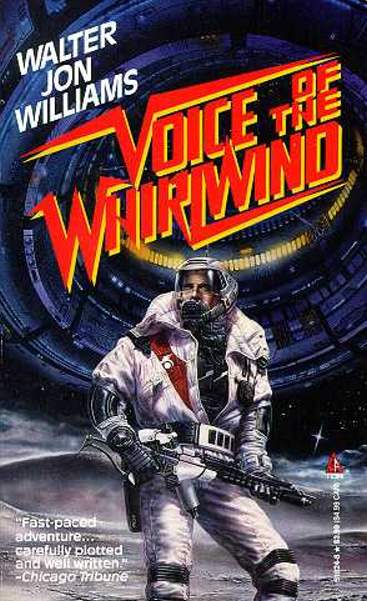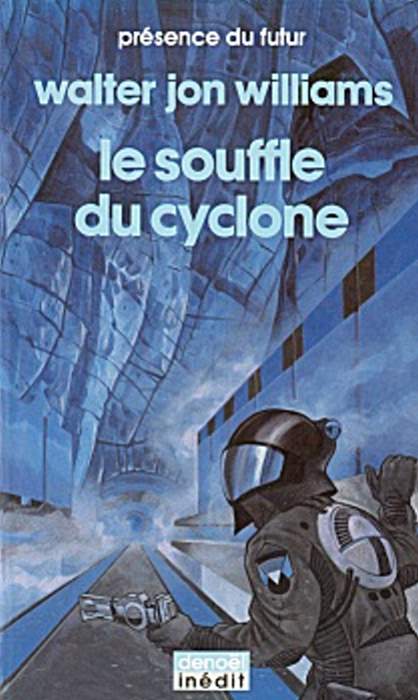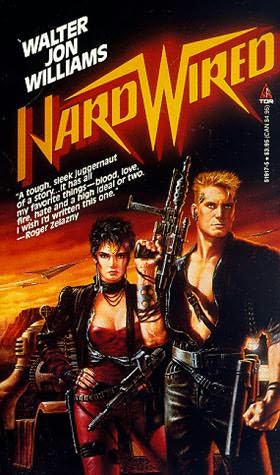April 28, 2007
Synners
Author: Pat Cadigan
Year: 1991
Category: Cyberpunk Books
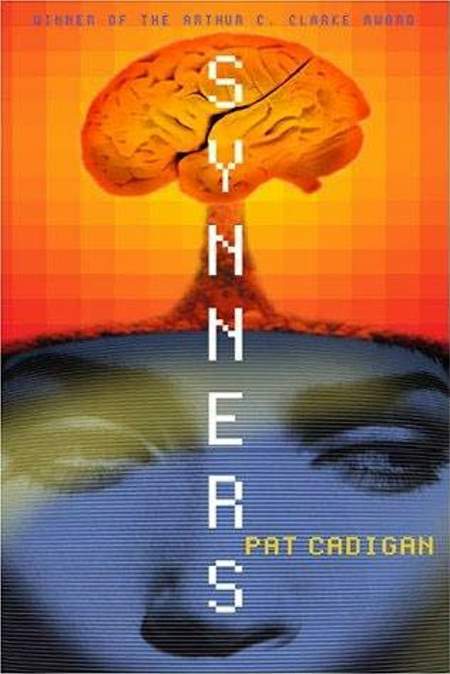
I’ve never been to Los Angeles but I tend to believe everything that’s written about it. It’s so easy to buy the idea that Americans would take heaven on earth (the beautiful oceans on one side, the awesome mountains on the other) and then slap their own putrid media hell right in the middle of it. Pat Cadigan’s future LA is actually a lot more pleasant than some cyberpunk futures. It’s not yet a dystopia. In fact there are plenty of worse places to live in our present reality. The worst things would seem to be terrible television (which is dominated by various subdivisions of porn and live action news reports) and appalling traffic control software (though why people don’t just ignore it I don’t know), not the terrible things you would expect to see in a grim future vision.
The plot here is this: a multinational corporation called Diversifications (also known as “The Dive”) buys a small conglomerate that have managed to invent a computer 2 brain interface but fail to foresee the consequences. It’s up to an adhoc group of hackers and video producers to put the genie back in the bottle. When I originally read the novel it didn’t occur to me to question this but where are the authorities in all of this? They’d just sit back and let the network go down the tubes? Where are the hackers from other parts of the world, or even other parts of the USA? Or even Diversifications themselves? Where are all these people when the net goes down?
In terms of technology, all information seems to be carried over an internet style network, whether it be TV or GridLid (the useless traffic monitoring system) or email or videos. Videos have, for the most part, replaced live performance and are made by the “Synners” of the title using various techniques including full body motion capture “hot suits”. There are video games (some of which use “hot suits”) but there don’t seem to be any coherent 3d game worlds or Virtual spaces in the net. Whether the network is meant to be our current Internet is unclear to me but it would certainly seem very similar. It also seems to have some unusual properties though: there’s a virus (Dr Fish) that appears to be able to mutate itself and penetrate any number of systems. This leads to the creation of some kind of AI that lives, in a distributed form, all around the net. This is one of a number of really shaky ideas in the novel. AI is not an emergent property of networks. Other ideas are pseudo technical nonsense. At one point Sam, trying to combat the metaphorical “Genie” in the net:
[…]Finding alternate routes of communication. She’d just never tried it with such a widespread virus waiting to pounce.
The virus had a sort of three-dimensional perception that required her to keep shifting her own antiviral protection in a cycle that seemed random with sudden bursts of regularity.
[…]
Within a couple of hours, she had achieved a point where she could open an access anywhere in the net and remain undetected, provided she didn’t try to do anything else except sit like an immovable bead on a string.
[…]
Some hours later she had managed a routine of virtual sympathetic vibrations, a kind pf virtual music. It wouldn’t accommodate real-time communication, only short messages in quick bursts.
I’m not sure this stuff is even meant to be believable. I won’t go into where the “virus” in this quote comes from (it’s not DR. Fish) but I will say that it’s pretty unlikely that a virus could come from there, the net and computers would have to work in a vastly more complicated way than they do in reality. This is where I suspect I will disagree with many people: sometimes a thing doesn’t have to be technically true to be poetically true. The intellectual bobbing and weaving conducted by the hackers in the book is a pretty good representation of the way hackers would like to see themselves; innovative, tireless problem solvers who can crack anything given enough caffeine.
Where Cadigan gets things right is in terms of consumer electronics. People carry “chip players” which are somewhat like MP3 players in that they are just a unit of storage with the specialised hardware to play audio files. I don’t think this idea existed at the time. No one bothers with desktop machines either, even the computers that appear to be desktop consoles are laptops. As previously mentioned TVs are just simplified computers attached to the net. People have been predicting that TVs would end up with huge flat screens since the 1950s so I can’t give too much credit for Cadigan’s use of them here but credit should be given for using (I don’t know who invented it) the term “narrowcasting” before it was anything like a buzzword.
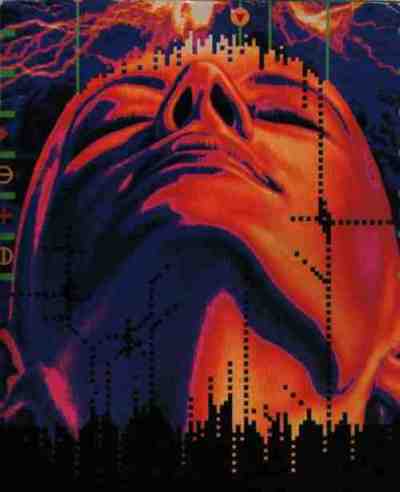
The frequent references to porn are worth discussing, if only to give credit where it’s due to Cadigan for realising that the net would be dominated (at least for a while) by it. It’s clear that mainstream TV is meant to have emulated the look and feel of pornography in it’s mainstream shows while, simultaneously, the viewing public have opened their minds to such an extent that they can be aroused by almost anything. The actual form of “food porn” or “war porn” is not discussed but, from the way it’s described, I don’t think it’s meant to be nude women covered in stuff, just long, lingering lustrous shots of gammon steaks or corpses. (Whether this could actually be described as “porn” (which seems to me to be a very specific thing) is open to debate. I don’t think it makes sense to broaden the definition of a word to the point where in means nothing). While TV already seems to be about gluttonous consumption in the real world I’m not convinced that we’ve gotten to the point where people are actually masturbating over pictures of car tires and anchovies. I guess we’ll see if we get there from here. It’s interesting that there don’t seem to be too many characters in the novel who actually watch all this porn, after all TV can’t survive without someone watching it. I guess the unwashed masses who don’t have any say in anything (including the novel, really) must be consuming it.
In spite of some unreasonable technology and the standard “loveable cyberpunks beating the corps” plot I actually really like Synners. It’s all about the characters. Gabe Ludovic, the commercials producer, is a rounded character, kind of dork. His legally emancipated ex-daughter, Sam, is a realistically know-it-all teenage hacker. His wife is a one dimensional cut glass bitch. Gabe’s co-workers have accurate office politics. Theres a great scene in the Dive’s lunch area where media-whore types are just sitting ’round shooting the shit in exactly the way that I imagine they do. The relationships are well handled, particularly that between Visual Mark (video producer and one of the first to receive the c2h sockets) and Gina Aeisi(another video producer). The protracted rituals of these character’s lives, in which they circle around each other but never quite “connect”, seem very real to me. Bosses dump on underlings before being dumped on themselves.
If you absolutely demand technology that seems real and avant-garde plotting then you best read something else. Otherwise you could do worse than read this.

